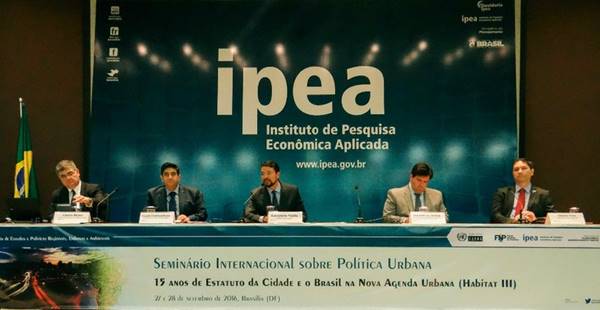
An international seminar on urban policy was held at the Institute for Applied Economic Research (IPEA) that focused on the development of the City Statute and the New Urban Agenda with focus on the UN Urban Habitat III Conference held in October 2016 in Ecuador.
The opening lecture was given by the president of the Forum, Rupak Chattopadhyay. He highlighted the expansion of metropolitan areas in the world with the rapid population growth, and remembered that countries like Brazil had and have a different way of dealing with the challenges of “urban agenda” due to the constitutional recognition of local government that allows the involvement of the national government in the development of cities.
Another point mentioned in Mr. Chattopadhyay’s speech was the lack of distinction in how urban and rural areas are handled by local governments in relation to their powers and responsibilities. The president of the Forum cited Germany, Switzerland and Australia as examples of countries using a more integrated approach between the federal entities and the national government to improve the population’s quality of life.
The Undersecretariat of Federal Affairs (SAF) of the Brazilian Presidency was represented by Deputy Head of Federal Affairs, Leonardo Americo, who recognized the importance of the seminar by stating that there was a need to discuss the future prospects for the National Policy of Urban Development of Brazil. He said that on the eve of the Habitat III, we must have a clear position on what are the main urban issues for the next 20 years. In relation to the New Challenges of Management, Mr. Americo reiterated the need for change, the need for an efficient, more innovative, more articulate and above all more austere management model.
The Executive Secretary of the National Front of Mayors (FNP), Gilberto Perre, stressed the importance of studies and analyses on the financing of cities for mayors to better understand their cities and try to find management solutions.
In addition to discussions about the City Statute and future challenges of the New Urban Agenda, the seminar also served for the launch of the 8th edition of the English translation of the book “Brazilian Federalism: Questions for Discussion. This initiative was carried out through a partnership between IPEA and the SAF. The book is part of the series Dialogues for Development and addresses three federalism themes: issues of public policy, territories and criteria for the transfers to the Brazilian states from the national government (Fund of State Participation).

